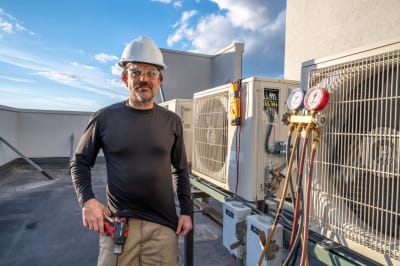Solar technicians in Idaho enjoy a competitive salary and an opportunity to grow in a field that seeks to solve most of the problems humans will have to deal with in the coming decades. For this reason, the field is set to enjoy an incredible boost in demand, concluding that there is no better time than now to begin a career as a solar technician.
Of course, anyone starting a career in this field has to be familiar with the steps involved right from the start. This is why we have provided the resource below.
Here, candidates will discover, among other things, the major considerations to consider, the licensure and certification requirements, and the best training programs for students to discover.
How to Become a Solar Technician in Idaho
The following are the major concentrations that all candidates must make to start their solar technician career in Idaho.
Step 1: Meet the Basic Requirements
Schools and employers usually set the basic requirements for becoming a solar technician in Idaho. They usually ask that candidates present their high school diplomas and transcripts. Those who don’t have one may utilize a GED equivalent.
Some may also ask for a candidate’s driver’s license and basic proficiency in reading and writing the English language.
Step 2: Receive Technical Training
Aspiring solar technicians in Idaho may consider the following options for their technical skills, which are arguably the most important step in the process.
- Academic Training—Candidates may consider academic training to strengthen their understanding of the fundamental principles of solar technology. Colleges often offer short-term certificate programs, basic certificate programs, and associate degree programs.
- Apprenticeship Training—Apprenticeship training for future solar technicians offers hands-on training and the opportunity for mentorship. Some companies may also pay students for their contributions.
- On-the-Job Training - Companies and potential employers may offer other on-the-job training programs in solar technology. Of course, candidates may combine multiple approaches (e.g., academic training and on-the-job training).
Step 3: Transferable Skills
Along with the technical expertise and awareness of regulatory codes they will be taught during their training, candidates are also expected to develop transferable skills such as attention to detail, teamwork, problem-solving, and communication skills.
Step 4: Employment & Continuing Education
Once individuals complete the above steps, they may secure employment and continue to improve themselves through continuing education. They may also consider professional credentials, following the guidelines we discuss below.
Licensure & Certification Requirements
The state of Idaho established a solar photovoltaic specialty license in 2012. Therefore, all professionals wanting to start a career in this field must obtain this license.
To do so, they must provide proof of training and certification from the North American Board of Certified Energy Practitioners (NABCEP). NABCEP is a professional organization providing solar certifications in multiple specialty areas.
Being NABCEP-certified provides additional career benefits, including networking opportunities and continuing education.
Another popular destination for nationally recognized solar technician credentials is the Interstate Renewable Energy Council (IREC). In addition to specialty credentials, the IREC offers top-class training programs for interested candidates.
Explore nearby states for certification:
Top Solar Technician Schools in Idaho
Candidates may receive top-quality solar technician training from any of these destinations in Idaho.
College of Eastern Idaho
Idaho Falls, ID Online + Campus
One of the first options for aspiring solar technicians in Idaho to consider for their training is the online program offered by the College of Eastern Idaho’s Workforce Training and Continuing Education Department.
Tuition
$140 - $210 per CreditContact
(208) 524-3000
admissions@cei.edu
Idaho State University
Pocatello, ID Online + Campus
Idaho State University offers an online Solar Panel Installer Training Program containing 40 training course hours. It is estimated to take 3 months to complete.
Tuition
$7,958 - $25,936Contact
(208) 282-2475
admiss@isu.edu
College of Southern Idaho
Twin Falls, ID Online + Campus
Lastly, candidates may also consider the College of Southern Idaho’s solar energy training programs for their education as aspiring solar technicians in Idaho.
Tuition
$3,360 - $6,840Contact
(208) 733-9554
eagles@csi.edu
Explore solar technician schools in Idaho by City:
Salary & Career Outlook
Experience, employer, and specialty area play key roles in determining how much a solar technician takes home in Idaho. Location is another preeminent factor.
Considering location with all else equal, Boise is Idaho’s highest-paying city for solar technicians. Professionals here take home an annual average salary of $71,455.
They are followed by solar technicians in Meridian, with an annual average salary of $51,242, and those in Idaho Falls, with an annual average salary of $50,670. These are, in turn, followed by solar technicians in Twin Falls, with an annual average salary of $49,072.
Generally, without focusing on any predominant factor, solar technicians in Idaho take home an annual average salary of $55,286 if they are in the midpoint. The top earners take home an annual average salary of $80,210, while the lowest-paid still manage an annual average salary of $38,107.





